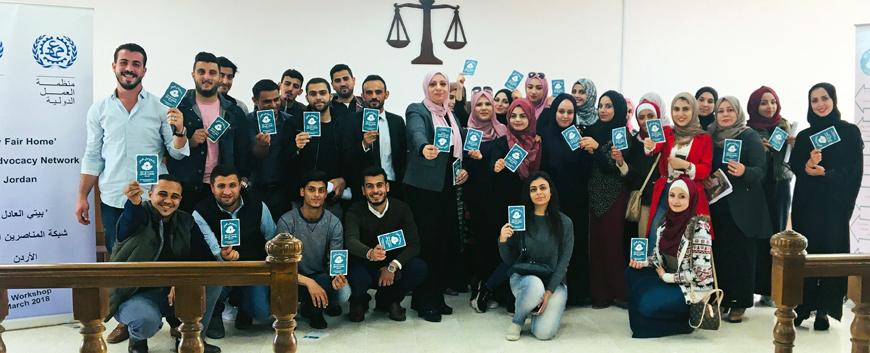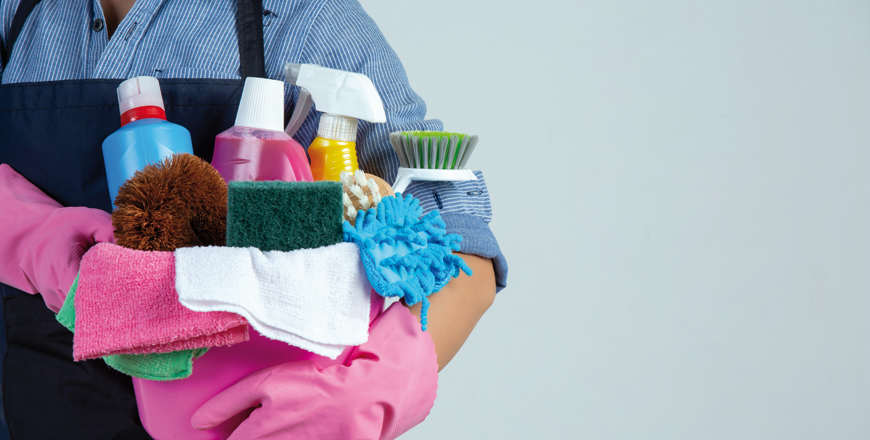You are here
Stakeholders encourage employers, public to take pledge to protect domestic workers’ rights
By Ana V. Ibáñez Prieto - Jun 21,2018 - Last updated at Jun 21,2018

'My Fair Home' campaign's youth leaders speak during a celebration for the International Domestic Workers Day in Amman, on Wednesday (Photo by Ana V. Ibáñez Prieto)
AMMAN — “The rights of domestic workers have received great attention from the concerned institutions through a package of measures, practices and new policies governing the preservation of their rights,” Human Rights Government Coordinator Basel Tarawneh affirmed on Wednesday, pointing out, however, the existence of “some individual mistakes that are not representative of the systematic approach”.
The remarks came during a celebration of the International Domestic Workers Day held by the My Fair Home (MFH) Campaign in Amman, where several young volunteers showcased their work in raising awareness on the importance of creating a positive relationship between employers and domestic workers.
Funded by the Swiss Agency for Development and Cooperation, MFH is an initiative of the International Labour Organisation (ILO) and the International Domestic Workers Federation, which encourages employers and the general public to take a pledge to respect domestic workers’ rights in their homes.
Celebrated worldwide on June 16, the International Domestic Workers Day marks the ILO’s adoption of the Convention on Decent Work for Domestic Workers in 2011. According to the UN agency, the treaty is the first to set out the rights of domestic workers, requiring countries to guarantee domestic employees the same rights as other workers regarding daily and weekly rest periods, working hours, overtime compensation, and paid annual leave; as well as adequate protection against violence.
Held under the patronage of Tarawneh, the event brought closure to a total of three months of trainings in how to advocate for domestic workers’ rights by conducting outreach activities in their communities, in addition to the creation of videos and other digital content for social media.
“The rights of domestic workers are an integral part of the human rights system, which is strongly linked to all Jordanian institutions,” Tarawneh said during the ceremony, noting that “the government is concerned with promoting the culture of human rights through the comprehensive national human rights plan launched in 2016”.
According to statistics from the Ministry of Labour, Jordan is home to a total of 48,194 domestic workers from approximately 22 nationalities, ministry representative Hayel Al Zaben said in a speech on behalf of the ministry's secretary general, calling for all concerned parties to “preserve the rights of all workers falling under this category, and to find innovative models towards a healthy relationship between employers and workers consistent with the Jordanian culture”.
“Addressing the concerns of migrant domestic workers requires actions at all levels — working with government and social partners, but also working to address long ingrained attitudes and practices,” ILO Chief Technical Adviser Sophia Kagan said, expressing that “this is why the ILO is pleased to be supporting the creative and inspiring initiatives of the Jordan MFH”.
“The rights set down in the convention and in any of the Jordanian legislations and policies shall be respected even when they are not among the most urgent issues to tackle,” Kagan continued, stressing that “violence and harassment can happen in more forms other than the physical, coming at the psychological and economical levels in the form of verbal abuse or the lack of payments”.
Depriving domestic employees from keeping their own legal documents is “one of the most poignant issues” according to one of the workers present at the event, who noted that “the withdrawal of passports from live-in employees can be later used against them as a tool to prevent them from going back home when everything gets dark”.
“The only way to avoid this is to educate individuals,” MFH Youth Leader Saif Rawajeeh said in response to the comment, pointing out that “there is no provision in the current Jordanian legislation to hold employers accountable for such situations”.
“It’s most important that we start at home — by addressing some of the assumptions that we hold ourselves. From there, we can share the messages with our families and communities,” MFH Youth Leader Lojayn Smadi added.
“There is a lot that many Jordanians do not know about migrant domestic workers’ rights,” MFH Youth Leader Rakan Al Rawahneh concluded, expressing hopes to “create a new social movement for change in Jordan through our community outreach activities and social media engagement”.
Related Articles
IRBID — The national coordinator of a campaign aimed at raising employers' awareness on domestic workers' rights and at changing the negativ
AMMAN — Undocumented female domestic workers are subject to exploitation, intimidation and forced labour, Jordanian NGO Tamkeen for Legal Ai
AMMAN — A local organisation on Thursday called for stricter measures to protect the rights of foreign domestic workers in Jordan.In a speci

















